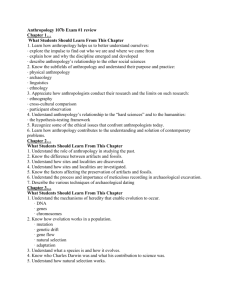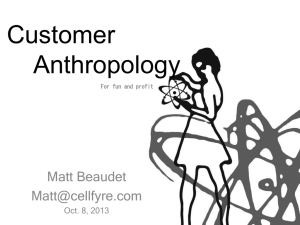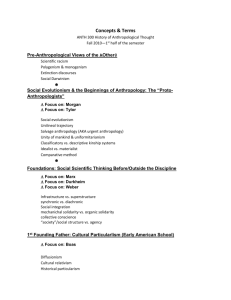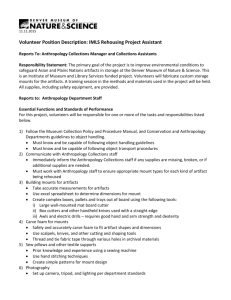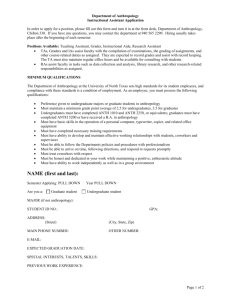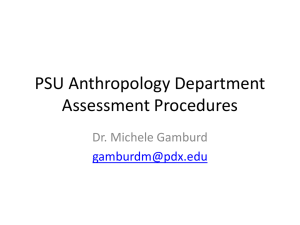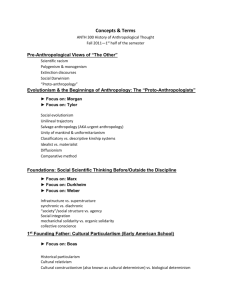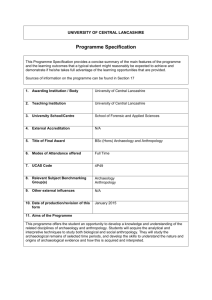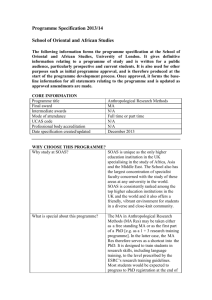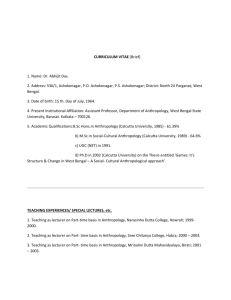MA Materials, Anthropology and Design
advertisement
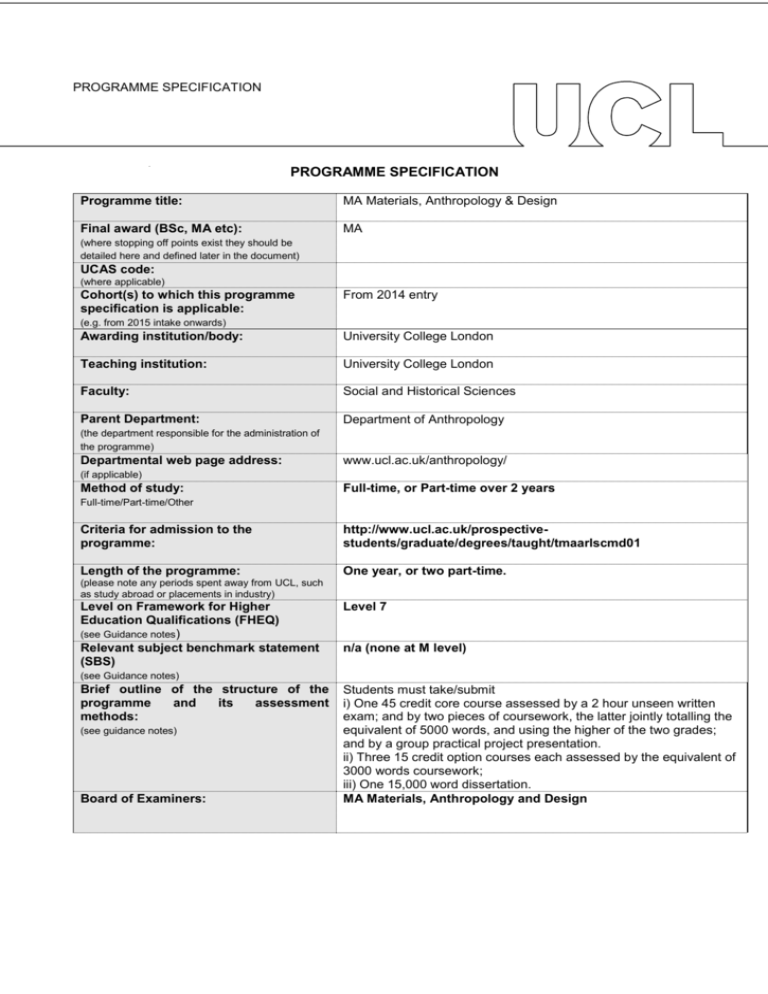
PROGRAMME SPECIFICATION PROGRAMME SPECIFICATION Programme title: MA Materials, Anthropology & Design Final award (BSc, MA etc): MA (where stopping off points exist they should be detailed here and defined later in the document) UCAS code: (where applicable) Cohort(s) to which this programme specification is applicable: From 2014 entry (e.g. from 2015 intake onwards) Awarding institution/body: University College London Teaching institution: University College London Faculty: Social and Historical Sciences Parent Department: Department of Anthropology (the department responsible for the administration of the programme) Departmental web page address: www.ucl.ac.uk/anthropology/ (if applicable) Method of study: Full-time, or Part-time over 2 years Full-time/Part-time/Other Criteria for admission to the programme: http://www.ucl.ac.uk/prospectivestudents/graduate/degrees/taught/tmaarlscmd01 Length of the programme: One year, or two part-time. (please note any periods spent away from UCL, such as study abroad or placements in industry) Level on Framework for Higher Education Qualifications (FHEQ) (see Guidance notes) Relevant subject benchmark statement (SBS) Level 7 n/a (none at M level) (see Guidance notes) Brief outline of the structure of the programme and its assessment methods: (see guidance notes) Board of Examiners: Students must take/submit i) One 45 credit core course assessed by a 2 hour unseen written exam; and by two pieces of coursework, the latter jointly totalling the equivalent of 5000 words, and using the higher of the two grades; and by a group practical project presentation. ii) Three 15 credit option courses each assessed by the equivalent of 3000 words coursework; iii) One 15,000 word dissertation. MA Materials, Anthropology and Design Professional body accreditation (if applicable): n/a Date of next scheduled accreditation visit: EDUCATIONAL AIMS OF THE PROGRAMME: Striking a balance between theory, practice and research, the programme will (a) introduce students to anthropological skills essential for the analytical engagement with materials in culture and society; (b) give them social science training in those skills (c) introduce students to aspects of materials in culture and society at an intellectually demanding level (d) equip students to undertake design anthropology work, thinking critically about design issues, and working collaboratively PROGRAMME OUTCOMES: The programme provides opportunities for students to develop and demonstrate knowledge and understanding, qualities, skills and other attributes in the following areas: A: Knowledge and understanding Knowledge and understanding of: Teaching/learning methods and strategies: Teaching/learning methods and strategies 1. How to assess materials from a social science (anthropology) and scientific perspective (archaeology) perspective. Including ‘old’ materials and ‘new’ materials in architecture, product design, production and waste. Analyse materials relevant to museum collections, art installations, archaeological and heritage sites, ethnographies and other sources. Solve problems of conflicting sources and conflicting interpretations, locate source materials and interpretative studies, use research resources (particularly research library catalogues, archival inventories, on-line catalogues, museum collections, digital databases and other traditional and digital resources relevant to anthropology and archaeology ). 2. Subject specific skills, for instance, analytical skills for understanding materials in society as well as their scientific properties and classification, materials analysis, critical analysis of product design, etc, textual bibliography, the editing of texts, familiarity with materials in culture and society. 3. Aspects of anthropological and archaeological theory, material culture and design theory, critical museology, visual culture, visual anthropology, cultural heritage, Acquisition of 1 through seminars and classes. Several courses, especially the required core course Materials, Anthropology and Design, will also entail practical instruction, e.g., visits to product design companies and trade fairs; archaeological field sites; UCL Museums & Collections to examine the physical characteristics of objects, visits to Kew Botanical Archive, the Institute of Materials, Minerals and Mining (IOM3), the British Museum to view materials in collections, visits to materials libraries, viewing of films and photographic archives in Department of Anthropology’s Audio-Visual Laboratory, analysis of collections in Department of Anthropology’s Material Culture Laboratory and Institute of Archaeology conservation laboratories, consultation of printed or digital catalogues in research libraries, notably the British Library, the Centre for Anthropology (the British Museum), the Wellcome Institute, and Senate House. Participation in MADE (Materials and Design Exchange network) and related events. Students will be required to attend all classes, study extensively on their own and, on the required course mentioned above and on several of the optional courses, prepare nonassessed course work regularly. Acquisition of 2 through the required core course Materials, Anthropology and Design. Acquisition of 3 through the optional courses offered. B: Skills and other attributes Intellectual (thinking) skills: Teaching/learning methods and strategies: The programme aims to help students: Acquisition of (a) and (b) is fostered in all courses offered in the Programme, in that all courses will introduce information that will need to be assessed critically and will demonstrate that how conflicting interpretations arise from the same information. (a) be precise, to be cautious in their assessment of evidence, and to understand through practice what the social and scientific analysis of materials can and cannot tell us. (b) question interpretations, however authoritative, and reassess evidence for themselves. Acquisition of (c) is acquired through preparation of the core course research methodology project which is based on creating an analytical engagement with materials in some form. (c) be creative in thinking about materials and their role in shaping culture and society C: Skills and other attributes Practical skills (able to): Teaching/learning methods and strategies: Assessment: This programme aims to help students with the following practical skills: (a) communicate effectively in writing (b) improve their knowledge of materials in culture and society, archaeology, anthropology, material culture, museums and heritage (c) use data bases, digital resources and word-processing programmes (d) present (non-assessed) seminar papers (e) listen and discuss ideas introduced during seminars (f) practice research techniques as used in a variety of specialised industries, museum institutions, archaeological and heritage fieldsites, research libraries and photo / film archives (g) maintain a constant rhythm of learning and research (h) choose their own long-essay and dissertation topics (i) adapt long-essays and dissertation topics to the information that they discover while working on their longessays (a) through the writing of long-essays and dissertations (b) through weekly reading exercises (c) through ‘hands-on’ instruction (d) through regular seminar presentations (e) through seminar discussion (f) through visits to museums, archives, libraries and art institutes (g) through the setting of clear deadlines for the submission of written work (h) through individual discussion with students Skills (a)-(g) inclusive will be taught mainly on the required core course Materials Anthropology and Design. They will be taught by scholars who have specialist expertise in these fields. The classes will include practical instruction, e.g., work on archaeological and ethnographic documentation techniques, work with museum collections and materials throughout the course, visits to exhibitions to examine the representations of materials in society, consultation of printed or digital catalogues in research libraries, notably the British Library, the Centre for Anthropology (British Museum), the Wellcome Institute, and Senate House. Assessment: (a)-(c), (f)-(i) by ‘unseen’ examination, course work, long-essays and dissertation. The latter is a required method of assessment; (e) not assessed in courses currently listed on the programme. D: Skills and other attributes Transferable skills (able to): Teaching/learning methods and strategies: Assessment: The programme will encourage students to: (a) long-essays, course work, dissertation (b) reading archaeological and anthropological texts for courses; writing short summaries of required readings in preparation for course (c) submitting word-processed written work; using data bases, consulting on-line library catalogues, using website material (d) seminar presentations (e) seminars, library visits, ‘hands-on’ instruction (f) reading about and discussing current ideas and practices (g) essays, dissertation, seminar presentations, ‘handson’ instruction, library and gallery visits (h) seminar papers (i) reading, class discussion (j) essays, dissertation, seminar discussion (k) essays, dissertation, seminar discussion (a) write good essays and dissertations (b) improve their analytical skills (c) use computer resources and information technology (d) present material orally and visually (e) listen and contribute in class (f) understand ideas that are very different to conventional ones (g) study a variety of materials in physical objects, exhibitions and digital materials, in museums, libraries, archives and research institutes of a kind that they will not have used as undergraduates (h) present (non-assessed) material orally and visually (i) reflect on their own ideas by becoming Assessment: acquainted with ideas and practices foreign to them (a)-(c), (f)-(k) ‘Unseen’ examination, long-essays and (j) make original contributions to dissertation; (e) not assessed in courses currently listed Archaeological and Anthropological on the programme though courses added in future may scholarship by following through their include oral assessment. ideas (k) assess evidence for themselves and The following reference points were used in designing the programme: the Framework for Higher Education Qualifications: (http://www.qaa.ac.uk/en/Publications/Documents/qualifications-frameworks.pdf); the relevant Subject Benchmark Statements: (http://www.qaa.ac.uk/assuring-standards-and-quality/the-quality-code/subject-benchmark-statements); the programme specifications for UCL degree programmes in relevant subjects (where applicable); UCL teaching and learning policies; staff research. Please note: This specification provides a concise summary of the main features of the programme and the learning outcomes that a typical student might reasonably be expected to achieve and demonstrate if he/she takes full advantage of the learning opportunities that are provided. More detailed information on the learning outcomes, content and teaching, learning and assessment methods of each course unit/module can be found in the departmental course handbook. The accuracy of the information contained in this document is reviewed annually by UCL and may be checked by the Quality Assurance Agency. Programme Organiser(s) Adam Drazin Name(s): Date of Production: 20 January 2014 Date of Review: April 2015 Date approved by Head of Department: April 2015 Date approved by Chair of Departmental Teaching Committee: Date approved by Faculty Teaching Committee April 2015 August 2015
